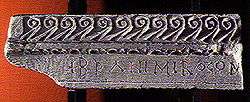Branimir of Croatia
| Branimir | |
|---|---|
|
The monument of Duke Branimir in Nin, Croatia | |
| Duke of the Croats | |
| Reign | 879–c. 892 |
| Predecessor | Zdeslav |
| Successor | Muncimir |
| Spouse | Maruša (Mariosa) |
| Royal House | House of Domagojević |
| Religion | Christian |
Branimir (Latin: Brannimero) was a ruler of the Duchy of Croatia who reigned as duke (knez) from 879 to 892. His country received papal recognition as a state from Pope John VIII on 7 June 879.[1] During his reign, Croatia retained its sovereignty from both Frankish and Byzantine rule and became de jure independent.[2][3]
Reign
Rise of Branimir's power

In 879 Branimir had Duke Zdeslav, a supporter of the Byzantine Empire, killed near Knin in a rebellion that he led.[4] Approval from the Holy See was brought about by Branimir's own actions to bring the Croats further away from the influence of Byzantium and closer to Rome. Duke Branimir wrote to Pope John VIII affirming this split from Byzantine and commitment to the Roman Papacy.
During the solemn divine service in St. Peter's church in Rome in 879, Pope John VIII gave his blessing to the duke and the whole Croatian people, about which he informed Branimir in his letters. Pope John VIII brought the very decision on May 21, 879, and confirmed it in his letter from June 7, 879.[3] This was the first time that the Croatian state was officially recognized (at that time the international legitimacy was given by the Pope).
In Branimir's time Venetians had to pay taxes to Croatia and to the Narentines for their ships traveling along the eastern Adriatic coast, while the Dalmatian cities under Byzantium paid 710 ducats of tribute to the Croatian ruler.[5] In 880, the Pope asked Duke Branimir for help for an armed escort of his delegates across southern Dalmatia and Zahumlje.[6]
Branimir's reign and Croatian Church
During Branimir's reign, the Croatian Bishop of Nin recognized the supreme ecclesiastical authority of the Roman Bishop, unlike the Archbishop of Split, who recognized the supremacy of the Patriarch of Constantinople. Duke Branimir promoted the Croatian Bishop of Nin to the Archbishop of Split, after the Archbishop's death in the Patriarchate of Aquileia without knowledge of the Holy See, which worsened his relations with the Pope. Under the influence of Methodus' baptising missions in 882 who made a stop in Croatia on his way from Moravia to Constantinople, Branimir endorsed parallel usage of Latin and Slavic in the Ecclesiastical service, which was not liked by the new Pope, Stephen V. Throughout his life, Duke Branimir worked on increasing Croatian independence. Branimir also undertook a pilgrimage to Cividale. His name is found in the Evangelistary of Cividale together with the name of his wife Mariosa (Croatian: Maruša or Marija).[7]
Branimir reigned until around 892. He was succeeded by Trpimir's third son, Muncimir.
House of Domagojević
Unlike his predecessor and successor (both Trpimirović), some historians suggest that Branimir might be a member of the House of Domagojević, particularly, one of Domagoj's sons. His name is an old Slavic name, and could be translated as "defender of the realm", or "defender of peace", as the word "mir" means peace in Slavic languages.
Legacy and honors
Today, there are several historical monuments (mostly altar beams from old Croatian churches) that bear the name of Duke Branimir. Currently, Croatia's government presents the Order of Duke Branimir as one of its highest state honours.
See also
References
- ↑ Fine, John Van Antwerp (1991). The early medieval Balkans: a critical survey from the sixth to the late twelfth century. University of Michigan Press. p. 261. ISBN 978-0-472-08149-3.
- ↑ Hrvatski leksikon (1996-1997) (Croatian)
- 1 2 Stjepan Antoljak, Pregled hrvatske povijesti, Split 1993., str. 43.
- ↑ Iohannes Diaconus: Istoria Veneticorum, p. 142 (Latin)
- ↑ Brković, Milko (October 2001). "The Papal Letters of the second half of the IXth Century to addressees in Croatia". Radovi (in Croatian). Institute for Historical Sciences of the Croatian Academy of Sciences and Arts in Zadar (43): 31–32. Retrieved 2012-07-27.
- ↑ Draganović, Krunoslav (1991). Povijest Bosne i Hercegovine od najstarijih vremena do godine 1463. Hrvatsko kulturno društvo Napredak. p. 191.
- ↑ Bethmann, C. Ludwig: Die Evangelienhandschrift zu Cividale, Hannover, 1877, p. 126
Further reading
- Klaić, Vjekoslav (1985). Povijest Hrvata: Knjiga Prva, Druga, Treća, Četvrta i Peta (in Croatian). Zagreb: Nakladni zavod Matice hrvatske. ISBN 978-86-401-0051-9.
| Branimir of Croatia | ||
| Regnal titles | ||
|---|---|---|
| Preceded by Zdeslav |
Duke of the Croats 879–c. 892 |
Succeeded by Muncimir |